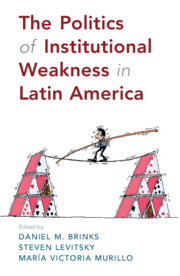Book contents
- The Politics of Institutional Weakness in Latin America
- The Politics of Institutional Weakness in Latin America
- Copyright page
- Contents
- Figures
- Maps
- Tables
- Contributors
- Acknowledgments
- 1 The Political Origins of Institutional Weakness
- 2 When (Electoral) Opportunity Knocks
- 3 The Stickiness of “Bad” Institutions
- 4 Presidential Crises in Latin America
- 5 Coercion Gaps
- 6 Aspirational Laws as Weak Institutions
- 7 The Social Determinants of Enforcement
- 8 A Multilevel Approach to Enforcement
- 9 What/Whose Property Rights?
- 10 Imported Institutions
- 11 Social Origins of Institutional Strength
- 12 Conclusion
- Bibliography
- Index
11 - Social Origins of Institutional Strength
Prior Consultation over Extraction of Hydrocarbons in Bolivia
Published online by Cambridge University Press: 06 May 2020
- The Politics of Institutional Weakness in Latin America
- The Politics of Institutional Weakness in Latin America
- Copyright page
- Contents
- Figures
- Maps
- Tables
- Contributors
- Acknowledgments
- 1 The Political Origins of Institutional Weakness
- 2 When (Electoral) Opportunity Knocks
- 3 The Stickiness of “Bad” Institutions
- 4 Presidential Crises in Latin America
- 5 Coercion Gaps
- 6 Aspirational Laws as Weak Institutions
- 7 The Social Determinants of Enforcement
- 8 A Multilevel Approach to Enforcement
- 9 What/Whose Property Rights?
- 10 Imported Institutions
- 11 Social Origins of Institutional Strength
- 12 Conclusion
- Bibliography
- Index
Summary
Why do some political institutions become strong, while others remain weak? Why do imported international legal norms remain aspirational rights in some countries, but are complied with and enforced in others? Why do institutions born out of similar conditions subsequently diverge in their levels of institutional strength? Social scientists have amply demonstrated that strong institutions are essential to economic and political development. At the dawn of the twentieth century, Max Weber (1978 [1922]) famously argued that capitalist development required the development of a strong, rational, state bureaucracy. More recently, political scientists and economists alike have highlighted the importance of strong political institutions for economic growth and development (Haggard 1990; North 1990). In political science, scholars have developed theories of why and how institutions originate and change (Knight 1992; Steinmo, Thelen, and Longstreth 1992; Thelen 2004). However, much less attention has been paid to the questions of why and how institutions strengthen or alternatively remain weak, which are at the center of this edited volume.
- Type
- Chapter
- Information
- The Politics of Institutional Weakness in Latin America , pp. 253 - 276Publisher: Cambridge University PressPrint publication year: 2020
- 2
- Cited by

